Home | Category: Islam and the Qur’an / Sharia
SUNNAHS
Sunnah are the examples of Muhammad. They are the practices and examples drawn from the Prophet Muhammad's life. Along with the Hadiths they are the most important texts in Islam after the Qur’an. They must adhere to a strict chain of narration that ensures their authenticity, taking into account factors such as the character of people in the chain and continuity in narration. Reports that fail to meet such criteria are disregarded.
One translation of the sunnah is the “customary way of doing.” The term generally refers to short narratives relating specific acts and sayings of Muhammad that express the ideal of behavior for pious, orthodox Muslim. They have been collected through a chain of hearsay. .[Source: Charles F. Gallagher, “International Encyclopedia of the Social Sciences”, 1960s, Encyclopedia.com]
The hadiths are reports of Muhammad's sayings and deeds recorded by his followers. Many of the precepts for appropriate behavior are specified in the Qur’an. Other spiritual and ethical guidelines are found in the hadiths, an authenticated record of the sayings and actions of Muhammad and his earliest companions. Devout Muslims regard their words, acts, and decisions — called collectively the sunna — as models to be emulated by later generations. Because of its normative character, the sunna is revered along with the Qur’an as a primary source of seriat (in Arabic, sharia ), or Islamic law. [Source: Library of Congress]
Websites and Resources: Islam IslamOnline islamonline.net ; Institute for Social Policy and Understanding ispu.org; Islam.com islam.com ; Islamic City islamicity.com ; BBC article bbc.co.uk/religion/religions/islam ; University of Southern California Compendium of Muslim Texts web.archive.org ; Encyclopædia Britannica article on Islam britannica.com ; Islam at Project Gutenberg gutenberg.org ; Muslims: PBS Frontline documentary pbs.org frontline
Qur’an (Quran, Koran) and Hadith: Quran translation in English alahazrat.net ; Quran in Easy English, Urdu, Arabic and 70 other languages qurango.com ; Quran.com quran.com ; Al-Quran.info al-quran.info; Quranic Arabic Corpus, shows syntax and morphology for each word corpus.quran.com ; Word for Word English Translation – emuslim.com emuslim.com/Quran ; Digitised Qurans in the Cambridge University Digital Library cudl.lib.cam.ac.uk ; Sunnah.com sunnah.com ; Hadith – search by keyword and by narrator ahadith.co.uk

flower of heaven
RECOMMENDED BOOKS:
Sunnah: “Sharh As-sunnah, Explanation of the Sunnah By Imam Al-barbahari (2 Vol Set) Amazon.com ;
“Hadith: Muhammad's Legacy in the Medieval and Modern World” by Jonathan A.C. Brown Amazon.com ;
“Sahih al-Bukhari”: (All Volumes in One Book) English Text Only by Imam Al Bukhari and Muhammad Mohee Uddin Amazon.com ;
“The Translation of the Meanings of Sahih Al-Bukhari” by Muhammed Ibn Ismaiel Al-Bukhari and Muhammad M. Khan
Amazon.com ;
“The Book of Hadith: Sayings of the Prophet Muhammad from the Mishkat Al Masabih” Amazon.com ;
“The Holy Quran” Arabic Text English Translation (English and Arabic Edition) Leather Bound
Amazon.com ;
“The Qur'an: A New Translation” by M. A. S. Abdel Haleem Amazon.com ;
“Sharī'a: Theory, Practice, Transformations” by Wael B. Hallaq Amazon.com ;
“The Lawful and the Prohibited in Islam (Al-Halal Wal Haram Fil Islam) by Yusuf Al-Qaradawi Amazon.com ;
“Sharia Law for Non-Muslims” by Bill Warner PhD, et al. Amazon.com ;
“Sharia Incorporated: A Comparative Overview of the Legal Systems of Twelve Muslim Countries in Past and Present” by Isabell Otto Amazon.com ;
“Islam Explained: A Short Introduction to History, Teachings, and Culture” by Ahmad Rashid Salim Amazon.com ;
“Welcome to Islam: A Step-by-Step Guide for New Muslims” by Mustafa Umar Amazon.com
Sunnah on Creation
The Sunnah that addresses Creation reads: “When God created the creation he wrote a book, which is near him upon the sovereign throne; and what is written in it is this: "Verily my compassion overcometh my wrath." “Say not, if people do good to us, we will do good to them, and if people oppress us, we will oppress them: but resolve that if people do good to you, you will do good to them, and if they oppress you, oppress them not again. [Source: Charles F. Horne, ed., The Sacred Books and Early Literature of the East, (New York: Parke, Austin, & Lipscomb, 1917), Vol. VI: Medieval Arabia, pp. 11-32]
“God saith: Whoso does one good act, for him are ten rewards, and I also give more to whomsoever I will; and whoso does ill, its retaliation is equal to it, or else I forgive him; and he who seeketh to approach me one cubit, I will seek to approach him two fathoms; and he who walketh toward me, I will run toward him; and he who cometh before me with the earth full of sins, but joins no partner to me, I will come before him with an equal front of forgiveness.
See Separate Article ALLAH, ANGELS, IDOLS, SAINTS AND CREATION IN ISLAM factsanddetails.com
Sunnahs on Prayer, Fasting and Reading the Qur'an
The Sunnah reads: “Angels come among you both night and day; then those of the night ascend to heaven, and God asks them how they left his creatures: they say, We left them at prayer, and we found them at prayer. The rewards for the prayers which are performed by people assembled together are double of those which are said at home. [Source: Charles F. Horne, ed., The Sacred Books and Early Literature of the East, (New York: Parke, Austin, & Lipscomb, 1917), Vol. VI: Medieval Arabia, pp. 11-32]
“Ye must not say your prayers at the rising or the setting of the sun: so when a limb of the sun appeareth, leave your prayers until her whole orb is up: and when the sun begins to set, quit your prayers until the whole orb hath disappeared; for, verily she riseth between the two horns of the devil. No neglect of duty is imputable during sleep; for neglect can only take place when one is awake: therefore, when any of you forget your prayers, say them when ye recollect.
“When any one of you goeth to sleep, the devil ties three knots upon his neck; and saith over every knot, "The night is long, sleep." Therefore, if a servant awake and remember God, it openeth one knot; and if he perform the ablution, it openeth another; and if he say prayers, it openeth the other; and he riseth in the morning in gladness and purity: otherwise he riseth in a lethargic state.
“When a Muslim performs the ablution, it washes from his face those faults which he may have cast his eyes upon; and when he washes his hands, it removes the faults they may have committed, and when he washes his feet, it dispels the faults toward which they may have carried him: so that he will rise up in purity from the place of ablution.
The Sunnah on fasting reads: “A keeper of fasts, who does not abandon lying and slandering, God cares not about his leaving off eating and drinking. “Keep fast and eat also, stay awake at night and sleep also, because verily there is a duty on you to your body, not to labor overmuch, so that ye may not get ill and destroy yourselves; and verily there is a duty on you to your eyes, ye must sometimes sleep and give them rest; and verily there is a duty on you to your wife, and to your visitors and guests that come to see you; ye must talk to them; and nobody hath kept fast who fasted always; the fast of three days in every month is equal to constant fasting: then keep three days' fast in every month. [Source: Charles F. Horne, ed., The Sacred Books and Early Literature of the East, (New York: Parke, Austin, & Lipscomb, 1917), Vol. VI: Medieval Arabia, pp. 11-32]
The Sunnah on Reading the Qur'an reads: “The state of a Muslim who reads the Qur'an is like the orange fruit, whose smell and taste are pleasant; and that of a Muslim who does not read the Qur'an is like a date which hath no smell, but a sweet taste; and the condition of any hypocrite who does not read the Qur'an is like the colocynth which hath no smell, but a bitter taste; and the hypocrite who reads the Qur'an is like the sweet bazil, whose smell is sweet, but taste bitter. Read the Qur'an constantly; I swear by him in the hands of whose might is my life, verily the Qur'an runneth away faster than a camel which is not tied by the leg. [Source: Charles F. Horne, ed., The Sacred Books and Early Literature of the East, (New York: Parke, Austin, & Lipscomb, 1917), Vol. VI: Medieval Arabia, pp. 11-32]
Sunnah on Charity
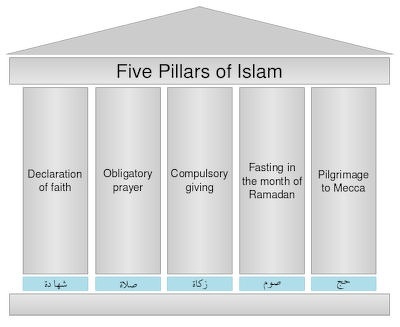
The Sunnah reads: “When God created the earth it began to shake and tremble; then God created mountains, and put them upon the earth, and the land became firm and fixed; and the angels were astonished at the hardness of the hills, and said, "O God, is there anything of thy creation harder than hills?" and God said, "Yes, water is harder than the hills, because it breaketh them." Then the angel said, "O Lord, is there anything of thy creation harder than water?" He said, "Yes, wind overcometh water: it does agitate it and put it in motion." They said, "O our Lord! is there anything of thy creation harder than wind?" He said, "Yes, the children of Adam giving alms: those who give with their right hand, and conceal from their left, overcome all." [Source: Charles F. Horne, ed., The Sacred Books and Early Literature of the East, (New York: Parke, Austin, & Lipscomb, 1917), Vol. VI: Medieval Arabia, pp. 11-32]
“The liberal man is near the pleasure of God and is near paradise, which he shall enter into, and is near the hearts of men as a friend, and he is distant from hell; but the niggard is far from God's pleasure and from paradise, and far from the hearts of men, and near the fire; and verily a liberal ignorant man is more beloved by God than a niggardly worshiper.
“A man's giving in alms one piece of silver in his lifetime is better for him than giving one hundred when about to die. Think not that any good act is contemptible, though it be but your brother's coming to you with an open countenance and good humor. “There is alms for a man's every joint, every day in which the sun riseth; doing justice between two people is alms; and assisting a man upon his beast, and with his baggage, is alms; and pure words, for which are rewards; and answering a questioner with mildness is alms, and every step which is made toward prayer is alms, and removing that which is an inconvenience to man, such as stones and thorns, is alms.
“The people of the Prophet's house killed a goat, and the Prophet said, "What remaineth of it?" They said, "Nothing but the shoulder; for they have sent the whole to the poor and neighbors, except a shoulder which remaineth." The Prophet said, "Nay, it is the whole goat that remaineth except its shoulder: that remaineth which they have given away, the rewards of which will be eternal, and what remaineth in the house is fleeting." Feed the hungry, visit the sick, and free the captive if he be unjustly bound.
Sunnah on Labor and Profit
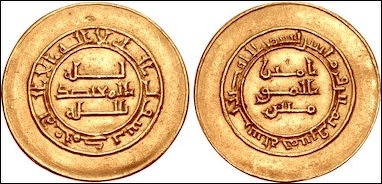
Abbasid-era coins
The Sunnah reads: “Verily the best things which ye eat are those which ye earn yourselves or which your children earn. Verily it is better for one of you to take a rope and bring a bundle of wood upon his back and sell it, in which case God guards his honor, than to beg of people, whether they give him or not; if they do not give him, his reputation suffers and he returns disappointed; and if they give him, it is worse than that, for it layeth him under obligations. [Source: Charles F. Horne, ed., The Sacred Books and Early Literature of the East, (New York: Parke, Austin, & Lipscomb, 1917), Vol. VI: Medieval Arabia, pp. 11-32]
“A man came to the Prophet, begging of him something, and the Prophet said, "Have you nothing at home?" He said, "Yes, there is a large carpet, with one part of which I cover myself, and spread the other, and there is a wooden cup in which I drink water." Then the Prophet said, "Bring me the carpet and the cup." And the man brought them, and the Prophet took them in his hand, and said, "Who will buy them?" A man said, "I will take them at one silver piece." He said, "Who will give more?" This he repeated twice or thrice. Another man said, "I will take them for two pieces of silver." Then the Prophet gave the carpet and cup to that man, and took the two pieces of silver, and gave them to the helper, and said, "Buy food with one of these pieces, and give it to your family, that they may make it their sustenance for a few days; and buy a hatchet with the other piece and bring it to me." And the man brought it; and the Prophet put a handle to it with his own hands, and then said, "Go, cut wood, and sell it, and let me not see you for fifteen days." Then the man went cutting wood, and selling it; and he came to the Prophet, when verily he had got ten pieces of silver, and he bought a garment with part of it, and food with part. Then the Prophet said, "This cutting and selling of wood, and making your livelihood by it, is better for you than coming on the day of resurrection with black marks on your face."
“Acts of begging are scratches and wounds by which a man wounds his own face; then he who wishes to guard his face from scratches and wounds must not beg, unless that a man asks from his prince, or in an affair in which there is no remedy.
See Separate Article MUSLIM FINANCE factsanddetails.com
Sunnah on Fighting for the Faith and Judgements

jihad flag
The Sunnah reads: “We came out with the Prophet, with a part of the army, and a man passed by a cavern in which were water and verdure, and he said in his heart, "I shall stay here, and retire from the world." Then he asked the Prophet's permission to live in the cavern; but he said, "Verily I have not been sent on the Jewish religion, nor the Christian, to quit the delights of society; but I have been sent on the religion inclining to truth, and that which is easy, wherein is no difficulty or austerity. I swear by God, in whose hand is my life, that marching about morning and evening to fight for religion is better than the world and everything that is in it: and verily the standing of one of you in the line of battle is better than supererogatory prayers performed in your house for sixty years. [Source: Charles F. Horne, ed., The Sacred Books and Early Literature of the East, (New York: Parke, Austin, & Lipscomb, 1917), Vol. VI: Medieval Arabia, pp. 11-32]
“When the Prophet sent an army out to fight, he would say, March in the name of God and by his aid and on the religion of the Messenger of God. Kill not the old man who can not fight, nor young children nor women; and steal not the spoils of war, but put your spoils together; and quarrel not among yourselves, but be good to one another, for God loveth the doer of good.
The Sunnah on Judgments reads: “The first judgment that God will pass on man at the day of resurrection will be for murder. Whosoever throws himself from the top of a mountain and killeth himself is in hell fire forever; and whosoever killeth himself with iron, his iron shall be in his hand, and he will stab his belly with it in hell fire everlastingly. [Source: Charles F. Horne, ed., The Sacred Books and Early Literature of the East, (New York: Parke, Austin, & Lipscomb, 1917), Vol. VI: Medieval Arabia, pp. 11-32]
“No judge must decide between two persons whilst he is angry. There is no judge who hath decided between men, whether just or unjust, but will come to God's court on the day of resurrection held by the neck by an angel; and the angel will raise his head toward the heavens and wait for God's orders; and if God orders to throw him into hell, the angel will do it from a height of forty years' journey. Verily there will come on a just judge at the day of resurrection such fear and horror, that he will wish, Would to God that I had not decided between two persons in a trial for a single date.
Sunnah on Women
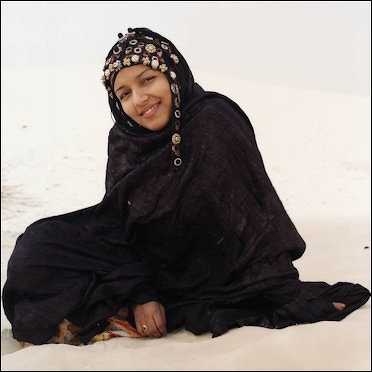
Tuareg woman
The Sunnah reads: “The world and all things in it are valuable, but the most valuable thing in the world is a virtuous woman. I have not left any calamity more hurtful to man than woman. A Muslim can not obtain (after righteousness) anything better than a well-disposed, beautiful wife: such a wife as, when ordered by her husband to do anything, obeys; and if her husband look at her, is happy; and if her husband swear by her to do a thing, she does it to make his oath true; and if he be absent from her, she wishes him well in her own person by guarding herself from inchastity, and taketh care of his property. [Source: Charles F. Horne, ed., The Sacred Books and Early Literature of the East, (New York: Parke, Austin, & Lipscomb, 1917), Vol. VI: Medieval Arabia, pp. 11-32]
“Verily the best of women are those who are content with little. Admonish your wives with kindness; for women were created out of a crooked rib of Adam, therefore if ye wish to straighten it, ye will break it; and if ye let it alone, it will be always crooked. Every woman who dieth, and her husband is pleased with her, shall enter into paradise. That which is lawful but disliked by God is divorce.
“A woman may be married by four qualifications: one, on account of her money; another, on account of the nobility of her pedigree; another, on account of her beauty; a fourth, on account of her faith; therefore look out for religious women, but if ye do it from any other consideration, may your hands be rubbed in dirt. A widow shall not be married until she be consulted; nor shall a virgin be married until her consent be asked, whose consent is by her silence. When the Prophet was informed that the people of Persia had made the daughter of Chosroes their queen, he said The tribe that constitutes a woman its ruler will not find redemption.
“Do not prevent your women from coming to the mosque; but their homes are better for them. O assembly of women, give alms, although it be of your gold and silver ornaments; for verily ye are mostly of hell on the day of resurrection. When ye return from a journey and enter your town at night, go not to your houses, so that your wives may have time to comb their disheveled hair.
See Separate Article WOMEN AND THE HADITHS, SUNNAHS AND THE QURAN factsanddetails.com
Sunnah on Slaves and and Dumb Animals
The Sunnah on slaves reads: “God has ordained that your brothers should be your slaves: therefore him whom God hath ordained to be the slave of his brother, his brother must give him of the food which he eateth himself, and of the clothes wherewith he clothes himself and not order him to do anything beyond his power, and if he does order such a work, he must himself assist him in doing it. [Source: Charles F. Horne, ed., The Sacred Books and Early Literature of the East, (New York: Parke, Austin, & Lipscomb, 1917), Vol. VI: Medieval Arabia, pp. 11-32]
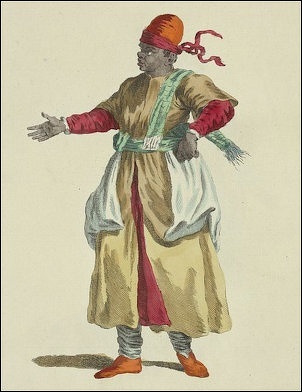
slave in Muslim Spain
“He who beats his slave without fault, or slaps him in the face, his atonement for this is freeing him. A man who behaves ill to his slave will not enter into paradise. “Forgive thy servant seventy times a day.
The Sunnah on dumb animals reads: “Bear God in respect of animals: ride them when they are fit to be ridden, and get off when they are tired. A man came before the Prophet with a carpet, and said, "O Prophet! I passed through a wood, and heard the voices of the young of birds; and I took and put them into my carpet; and their mother came fluttering round my head, and I uncovered the young, and the mother fell down upon them, then I wrapped them up in my carpet; and there are the young which I have." Then the Prophet said, "Put them down." And when he did so, their mother joined them: and the Prophet said, "Do you wonder at the action of the mother toward her young? I swear by him who hath sent me, verily God is more loving to his servants than the mother to these young birds. Return them to the place from which ye took them, and let their mother be with them." [Source: Charles F. Horne, ed., The Sacred Books and Early Literature of the East, (New York: Parke, Austin, & Lipscomb, 1917), Vol. VI: Medieval Arabia, pp. 11-32]
“Verily there are rewards for our doing good to dumb animals, and giving them water to drink. An adulteress was forgiven who passed by a dog at a well; for the dog was holding out his tongue from thirst, which was near killing him; and the woman took off her boot, and tied it to the end of her garment, and drew water for the dog, and gave him to drink; and she was forgiven for that act.
Sunnah on Government
The Sunnah reads: “Government is a trust from God, and verily government will be at the day of resurrection a cause of inquiry, unless he who hath taken it be worthy of it and have acted justly and done good. Verily a king is God's shadow upon the earth; and every one oppressed turneth to him: then when the king doeth justice, for him are rewards and gratitude from his subjects: but, if the king oppresses, on him is his sin, and for the oppressed resignation. [Source: Charles F. Horne, ed., The Sacred Books and Early Literature of the East, (New York: Parke, Austin, & Lipscomb, 1917), Vol. VI: Medieval Arabia, pp. 11-32]
“That is the best of men who dislikes power. Beware! ye are all guardians; and ye will be asked about your subjects: then the leader is the guardian of the subject, and he will be asked respecting the subject; and a man is a shepherd to his own family, and will be asked how they behaved, and his conduct to them; and a wife is guardian to her husband's house and children, and will be interrogated about them; and a slave is a shepherd to his master's property, and will be asked about it, whether he took good care of it or not.
“There is no prince who oppresses the subject and dieth, but God forbids paradise to him. If a negro slave is appointed to rule over you, hear him, and obey him, though his head should be like a dried grape. There is no obedience due to sinful commands, nor to any other than what is lawful.
“O Prophet of God, if we have princes over us, wanting our rights, and withholding our rights from us, then what do you order us? He said, "Ye must hear them and obey their orders: it is on them to be just and good, and on you to be obedient and submissive." He is not strong or powerful who throws people down, but he is strong who withholds himself from anger. When one of you getteth angry, he must sit down, and if his anger goeth away from sitting, so much the better; if not, let him lie down.
See Separate Article ISLAM AND GOVERNMENT: CLERICS, AUTHORITY, HISTORY AND THE CALIPHATE factsanddetails.com
Sunnahs on Hospitality, Vanities and Sundry Matters
The Sunnah reads: “When a man cometh into his house and remembereth God and repeats his name at eating his meals, the devil saith, to his followers, "Here is no place for you to stay in tonight, nor is there any supper for you." And when a man cometh into his house without remembering God's name, the devil saith to his followers, "You have got a place to spend the night in." [Source: Charles F. Horne, ed., The Sacred Books and Early Literature of the East, (New York: Parke, Austin, & Lipscomb, 1917), Vol. VI: Medieval Arabia, pp. 11-32]
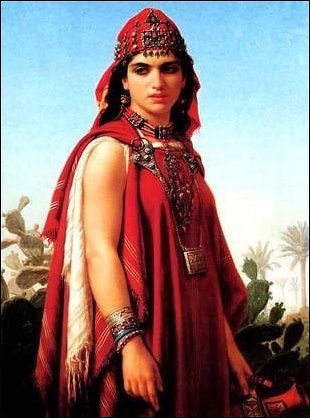
“Whosoever believeth in God and the day of resurrection must respect his guest, and the time of being kind to him is one day and one night, and the period of entertaining him is three days, and after that, if he does it longer, he benefits him more. It is not right for a guest to stay in the house of the host so long as to inconvenience him. I heard this, that God is pure, and loveth purity; and God is liberal, and loveth liberality; God is munificent, and loveth munificence: then keep the courts of your house clean, and do not be like Jews who do not clean the courts of their houses.
The Sunnah on Vanities and Sundry Matters reads: “The angels are not with the company with which is a dog, nor with the company with which is a bell. A bell is the devil's musical instrument. The angels do not enter a house in which is a dog, nor that in which there are pictures. [Source: Charles F. Horne, ed., The Sacred Books and Early Literature of the East, (New York: Parke, Austin, & Lipscomb, 1917), Vol. VI: Medieval Arabia, pp. 11-32]
“Every painter is in hell fire; and God will appoint a person at the day of resurrection for every picture he shall have drawn, to punish him, and they will punish him in hell. Then if you must make pictures, make them of trees and things without souls.
“Whosoever shall tell a dream, not having dreamed, shall be put to the trouble at the day of resurrection of joining two barleycorns; and he can by no means do it; and he will be punished. And whosoever listens to others' conversation, who dislike to be heard by him, and avoid him, boiling lead will be poured into his ears at the day of resurrection. And whosoever draws a picture shall be punished by ordering him to breathe a spirit into it, and this he can never do, and so he will be punished as long as God wills.
“O servants of God, use medicine: because God hath not created a pain without a remedy for it, to be the means of curing it, except age; for that is a pain without a remedy. He who is not loving to God's creatures and to his own children, God will not be loving to him. The truest words spoken by any poet are those of Lebid, who said, "Know that everything is vanity except God."
“Verily he who believeth fights with his sword and tongue: I swear by God, verily abuse of infidels in verse is worse to them than arrows. Meekness and shame are two branches of faith, and vain talking and embellishing are two branches of hypocrisy. The calamity of knowledge is forgetfulness, and to lose knowledge is this, to speak of it to the unworthy.
See Separate Article ARAB CHARACTER AND PERSONALITY factsanddetails.com
Sunnahs on Death
The Sunnah reads: “Wish not for death any one of you; either a doer of good works, for peradventure he may increase them by an increase of life; or an offender, for perhaps he may obtain the forgiveness of God by repentance. When the soul is taken from the body the eyes follow it, and look toward it: on this account the eyes remain open. [Source: Charles F. Horne, ed., The Sacred Books and Early Literature of the East, (New York: Parke, Austin, & Lipscomb, 1917), Vol. VI: Medieval Arabia, pp. 11-32]
“When a believer is nearly dead, angels of mercy come, clothed in white silk garments, and say to the soul of the dying man, "Come out, O thou who art satisfied with God, and with whom he is satisfied; come out to rest, which is with God, and the sustenance of God's mercy and compassion, and to the Lord, who is not angry." Then the soul cometh out like the smell of the best musk, so that verily it is handed from one angel to another, till they bring it to the doors of the celestial regions. Then the angels say, "What a wonderful, pleasant smell this is which is come to you from the earth!" Then they bring it to the souls of the faithful, and they are very happy at its coming; more than ye are at the coming of one of your family after a long journey. And the souls of the faithful ask it, "What hath such a one done, and such a one? how are they?" and they mention the names of their friends who are left in the world. And some of them say, "Let it alone; do not ask it, because it was grieved in the world, and came from thence aggrieved; ask it when it is at rest." Then the soul saith when it is at ease, "Verily such a one about whom ye ask is dead." And as they do not see him among themselves, they say to one another, "Surely he was carried to his mother, which is hell fire."
The Sunnah on the State after Death reads: “To whomsoever God giveth wealth, and he does not perform the charity due from it, his wealth will be made into the shape of a serpent on the day of resurrection, which shall not have any hair upon its head, and this is a sign of its poison and long life, and it hath two black spots upon its eyes, and it will be twisted round his neck like a chain on the day of resurrection; then the serpent will seize the man's jaw-bones, and will say, "I am thy wealth, the charity for which thou didst not give, and I am thy treasure, from which thou didst not separate any alms." [Source: Charles F. Horne, ed., The Sacred Books and Early Literature of the East, (New York: Parke, Austin, & Lipscomb, 1917), Vol. VI: Medieval Arabia, pp. 11-32]
See Separate Article ISLAMIC VIEWS ON HEAVEN, HELL, DEATH AND JUDGEMENT factsanddetails.com

Muhammed visiting Paradise
Sunnah on Destiny
The on destiny Sunnah reads: “The hearts of men are at the disposal of God like unto one heart, and he turneth them about in any way that he pleases. O Director of hearts, turn our hearts to obey thee. The first thing which God created was a pen, and he said to it, "Write." It said, "What shall I write?" And God said, "Write down the quantity of every separate thing to be created." And it wrote all that was and all that will be to eternity. [Source: Charles F. Horne, ed., The Sacred Books and Early Literature of the East, (New York: Parke, Austin, & Lipscomb, 1917), Vol. VI: Medieval Arabia, pp. 11-32]
“There is not one among you whose sitting-place is not written by God, whether in the fire or in paradise. The companions said, "O Prophet! since God hath appointed our place, may we confide in this and abandon our religious and moral duty?" He said, "No, because the happy will do good works, and those who are of the miserable will do bad works."
“The Prophet of God said that Adam and Moses (in the world of spirits) maintained a debate before God, and Adam got the better of Moses; who said, "Thou art that Adam whom God created by the power of his hands, and breathed into thee from his own spirit, and made the angels bow before thee, and gave thee an habitation in his own paradise: after that thou threwest man upon the earth, from the fault which thou committed." Adam said, "Thou art that Moses whom God elected for his prophecy, and to converse with, and he gave to thee twelve tables, in which are explained everything, and God made thee his confidant, and the bearer of his secrets: then how long was the Bible written before was created?" Moses said, "Forty years." Then Adam said, "Didst thou see in the Bible that Adam disobeyed God?" He said, "Yes." Adam said, "Dost thou then reproach me on a matter which God wrote in the Bible forty years before creating me?"
See Separate Article MUSLIM BELIEFS ABOUT ONE GOD, MANKIND, FATE AND RELIGION factsanddetails.com
Image Sources: Wikimedia, Commons
Text Sources: Internet Islamic History Sourcebook: sourcebooks.fordham.edu; Arab News, Jeddah; “Islam, a Short History” by Karen Armstrong; “A History of the Arab Peoples” by Albert Hourani (Faber and Faber, 1991); “Encyclopedia of the World Cultures” edited by David Levinson (G.K. Hall & Company, New York, 1994). “Encyclopedia of the World’s Religions” edited by R.C. Zaehner (Barnes & Noble Books, 1959); Metropolitan Museum of Art, National Geographic, BBC, New York Times, Washington Post, Reuters, Associated Press, AFP, Library of Congressand various books and other publications.
Last updated March 2024
